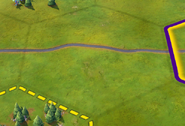![]() Back to the list of tile improvements
Back to the list of tile improvements
Roads are a special type of tile improvement in Civilization VI. They accelerate the ![]() Movement of units on land, permitting them also to cross rough terrain and features such as Woods and Rivers easily.
Movement of units on land, permitting them also to cross rough terrain and features such as Woods and Rivers easily.
Roads are not created by Builders, but automatically by Traders as they serve their ![]() Trade Routes on land. Alternatively, roads may be created by Military Engineers, although this is a much more tedious process. A Military Engineer may build a Road on only 1 tile at a time, and each tile consumes one of its
Trade Routes on land. Alternatively, roads may be created by Military Engineers, although this is a much more tedious process. A Military Engineer may build a Road on only 1 tile at a time, and each tile consumes one of its ![]() build charges (before researching Steam Power). Since each one has only 2 charges, you can see that they aren't a good alternative to road building in the early through middle game. So, consider establishing strategic
build charges (before researching Steam Power). Since each one has only 2 charges, you can see that they aren't a good alternative to road building in the early through middle game. So, consider establishing strategic ![]() Trade Routes early in the game to give yourself a good road network around the middle game.
Trade Routes early in the game to give yourself a good road network around the middle game.
Every ![]() District (including the City Center) and wonder automatically creates a road on its tile, which remains even if the feature is pillaged or the city is razed. Roads themselves can be manually pillaged by a marauding military unit.
District (including the City Center) and wonder automatically creates a road on its tile, which remains even if the feature is pillaged or the city is razed. Roads themselves can be manually pillaged by a marauding military unit.
Types of Roads, upgrading[]
Roads are upgraded by researching technologies...or, more specifically, by reaching specific eras. Upon doing so, all roads in your territory will upgrade automatically to the next level. Roads in neutral lands, however, will remain the same until one of your Traders passes along them again (effectively paving a brand new road over the old one).
In the event that a Trader from another civilization which has unlocked more advanced roads enters your territory, they will also upgrade the road they are using or creating.
In Gathering Storm, Military Engineers are able to build a Railroad even on tiles without a preexisting Road once Steam Power has been discovered. This is done at the rate of 1 tile per turn and costs 1 ![]() Iron and
Iron and ![]() Coal each, but does not consume
Coal each, but does not consume ![]() build charges.
build charges.
| Name | Era | Notes |
|---|---|---|
| Ancient Roads | Ancient | Starting road, well-packed dirt. Most terrain costs 1 MP; crossing rivers still costs 3 MP. |
| Classical Roads | Classical | Adds bridges over rivers; crossing costs reduced to only 1 MP. |
| Industrial Roads | Industrial | Paved roads are developed; 0.75 MP per tile. |
| Modern Roads | Modern | Asphalted roads are developed; 0.50 MP per tile. |
Strategy[]
Creating roads in Civilization VI becomes less of a hurdle and more of a clever strategic choice at the right moment. You should always remember that roads are now created as a byproduct of ![]() Trade Routes, so each time you have to start a new route, take a moment to consider whether or not you can use it to create a road to somewhere you need. For example, if there's a nearby civilization or city-state you would like to attack, consider sending a
Trade Routes, so each time you have to start a new route, take a moment to consider whether or not you can use it to create a road to somewhere you need. For example, if there's a nearby civilization or city-state you would like to attack, consider sending a ![]() Trade Route first so a road forms, allowing your army to reach its destination more quickly. This is especially important in the early game, when there are no roads at all and your military may easily get bogged down in hilly or forested terrain while trying to reach its target. Later in the game, a considerable road network will exist thanks to both domestic trade and your neighbors trading with your cities, so road creation will be almost unnecessary.
Trade Route first so a road forms, allowing your army to reach its destination more quickly. This is especially important in the early game, when there are no roads at all and your military may easily get bogged down in hilly or forested terrain while trying to reach its target. Later in the game, a considerable road network will exist thanks to both domestic trade and your neighbors trading with your cities, so road creation will be almost unnecessary.
Keep in mind, however, that roads have no allegiance - the same roads that carry your units to your enemies' cities can carry your enemies' units to your cities. If your territory is being invaded, you can slow the enemy units' advance by pillaging roads you don't plan to use yourself.
Roads cannot be removed by a Builder or a Military Engineer.
Gallery[]
Related achievements[]

|
Trans-Siberian Railroad
Playing as Russia, have a city that is at least 60 tiles away from your capital, connected by a Trade Route and road at the start of the turn.
|
See also[]
- Road(s) in other games





